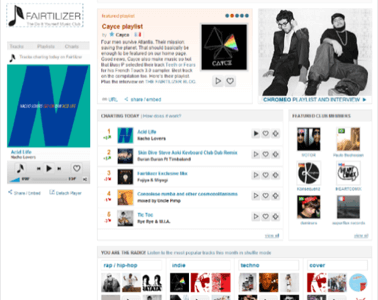Fairtilizer isn’t a record company – it’s a new music company. What’s the difference? A record company is about owning the rights to music and establishes an employer/employee relationship with the artists. A music company, on the other hand, is about having artists establish a relationship with a service. At Fairtilizer, they believe the services they provide will establish them as the “music company” of the future.

This week, Fairtilizer has launched the first part of their new distribution platform: an embeddable player which allows indie artists to share their music anywhere on the net from web sites to blogs to social networks.
About Fairtilizer
We told you about Fairitlizer over a year ago, when the company was still in private alpha. The easiest way to describe the site is to say that it combines the discovery aspects of Hype Machine with the distribution model of Tunecore. At the time of our initial writing, the company let artists upload tracks which visitors could browse through to find music they liked. Now Fairtilizer has opened its doors and is launching the next phase of their service: distribution.

Artists can now use one unified interface provided by Fairtilizer to distribute songs to blogs, web sites, social networks, and digital music stores…yes, even iTunes (The digital stores piece is coming soon, the others are available now). The distribution is aided by an embeddable player which can be added to any web site. The player comes in four different sizes and has shuffle and autoplay options as well as the ability to stream a customizable playlist. Once embedded, artists can then easily track analytics like downloads and plays per country.
The Fairtilzer Player:

Additionally, on the Fairtilizer web site itself, each track page comes with customizable URL, artwork, space for description and links (like to artist web sites, stores, and booking contacts, etc.), and a comment board for listeners. Tracks can be set to streaming only or made available for download, and soon artists will be able to mark them for sale, too, if they so desire. The tracks can also be set to public or private.
That private setting is designed to help artists in the initial phases before the launch of a new tune. Traditionally, launching a new track involves three steps: production, promotion, and distribution. With record companies today, leaks can occur in both the production and promotion phases as tracks are sent back and forth between artists, producers, DJs, journalists, and other taste makers who receive a first look before the track becomes publicly available. To combat those leaks, Fairtilizer provides these “private streams” instead. Artists will be able to send the track to specific people just as they did before, but the track will be protected from piracy and leaks.
The Future of Music
Although Fairtilizer will provide tools for artists wishing to sell their music, the focus isn’t just on music sales. Instead, it focuses on providing all the tools an artist would need to get their music discovered, downloaded, shared, and distributed.
In the future, says Olivier Rosset, a former music exec and co-founder of Fairtilizer, it won’t be about who owns the rights to a recording anymore. Music will instead center around the URL. And at Fairtilizer, they want to be the company that best helps an artist get that URL, that single track, onto the most sites across the internet.

















